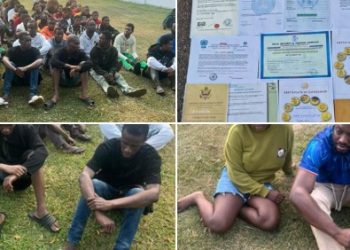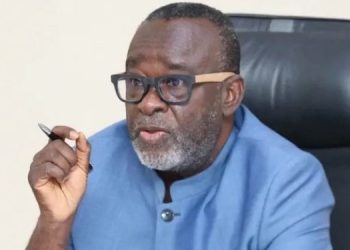Strategic Mobilisation Ghana Limited (SML) has strongly rejected allegations by the Office of the Special Prosecutor (OSP) that its contracts with the Ghana Revenue Authority (GRA) were technically deficient, unnecessary, and caused financial loss to the state.
According to the company, verifiable evidence from state agencies and data from the Bank of Ghana (BoG) and the National Petroleum Authority (NPA) show that its work has saved Ghana billions in previously lost petroleum revenues.
Speaking at a press conference in Accra, the company’s solicitor, Mr. Cephas Boyuo, said SML’s operations have been “lawful, transparent, and nationally beneficial,” and fully executed under the oversight of the GRA and the Ministry of Finance.
“SML has, from its inception, operated under full regulatory visibility. Our client and its operations have been lawful, technically sound, and nationally beneficial. The claim of inappropriateness or underperformance is inconsistent with verified evidence provided by state agencies themselves,” Mr. Boyuo asserted.
Massive leakages to record tax gains
Before SML’s deployment in May 2020, Ghana’s downstream petroleum sector suffered massive leakages and under-declarations.
3.2bn litres of fuel lost
In just 16 months, over 3.2 billion litres of Petrol, Diesel, and LPG were lost to manipulation and weak monitoring systems.
Losses drop to 260m litres
However, after SML’s technology was introduced to monitor the sector, the losses dropped dramatically to just 260 million litres — a decline of over 90%.
According to data from the NPA and the Bank of Ghana, this improvement was not due to “natural consumption increases,” as claimed by the OSP, but the direct result of SML’s real-time monitoring and audit systems.
“SML was engaged by the GRA specifically to close the gap between traded and taxable volumes, and the evidence shows that this was achieved. The data speaks for itself,” Mr. Boyuo said.
He noted that within a year of deployment, taxable petroleum volumes surged from a monthly average of 207,885,058 litres (January–December 2019) to 450,175,163 litres (May 2020–April 2021).
GH¢20.31bn additional revenue
The resulting increase generated an additional GH¢20.31 billion in tax revenue at an average tax rate of GH¢1.44 per litre.
Audited performance and verified correspondence
Mr. Boyuo cited official GRA documents — including a Public Affairs statement dated December 20, 2023, and a Legal Department letter dated October 14, 2025 — which confirm that SML had indeed delivered substantial value to the state.
“The allegation that SML was paid huge sums of money without providing any service is false. GRA’s own correspondence confirms that our client’s work produced measurable results that informed recovery actions and post-entry adjustments,” he said.
The company added that its services had helped detect widespread under-declarations, misclassifications, and bonded-warehouse leakages, which had previously cost the country billions in lost taxes.
Historical Auditor-General reports between 2012 and 2016 revealed that Ghana lost over GH¢1.67 billion due to customs irregularities, including undervaluations and forged exemptions — the very inefficiencies SML was contracted to address.
99.9% system uptime
SML detailed that between April 2020 and January 2024, it had installed and commissioned fully operational metering systems across all 25 petroleum depots nationwide.
These facilities are equipped with Remote Terminal Units (RTUs), reliable power systems, and SCADA-based platforms for continuous 24-hour data transmission from import discharge to depot release.
The company said its systems operate with 99.9% uptime, ensuring uninterrupted visibility of petroleum movements.
Contrary to the OSP’s claims, the use of waybill scanning is not a sign of metering failure but a legitimate method of resolving data discrepancies.
“The OSP’s interpretation of waybill scanning as a sign of system failure is technically flawed,” Boyuo said.
“Waybills are the legal evidence in petroleum tax audits, not electronic data. Electronic records support analysis, but litigation depends on physical waybills. SML’s metering systems have never failed.”
Certified international expertise
To ensure precision and compliance with global standards, SML engaged certified Honeywell engineers from the United States, India, Egypt, South Africa, and the Philippines, who worked alongside Ghanaian engineers under GRA supervision.
All installations were validated by the Ghana Standards Authority and certified by relevant regulatory bodies.
“Our meters were installed, calibrated, and tested under the strictest standards. Every installation was supervised and validated by the GRA and the Standards Authority. The meters have never failed,” Boyuo emphasised.
Unfair treatment by former Finance Minister
The solicitor also disclosed that SML endured severe financial hardship during its first ten months of operation because the Ministry of Finance, under Ken Ofori-Atta, failed to release payments promptly.
“This is a performance-based contract, yet for ten months, SML was not paid a cedi,” Boyuo revealed.
“In addition, the then minister refused to grant tax exemptions on imported equipment, forcing the company to bear the full cost. So it is untrue that Ken Ofori-Atta had any interest in SML. The company is wholly owned by Mr. Evans Adusei.”
Challenging the OSP’s overreach
SML also accused the OSP of exceeding its mandate by acting as “investigator, prosecutor, and judge.”
Boyuo stressed that the OSP’s role is to investigate and submit evidence to the courts, not to make public pronouncements implying guilt before adjudication.
“The OSP is a fact-finding institution. Its job is to investigate, not to convict in the media. What it has done is to denounce individuals before due process — and that undermines fairness,” he said.
Response to presidential termination directive
Following President John Dramani Mahama’s directive for the immediate termination of SML’s contracts with the Ministry of Finance and GRA — based on the OSP’s findings — SML has submitted a comprehensive response to the Presidency and the Attorney-General.
Mr. Boyuo explained that the company’s submission includes “documentary evidence addressing every paragraph of the OSP report,” proving the lawfulness, value, and effectiveness of SML’s work.
“We are confident that a fair review of our submission will show that SML’s contracts were lawful, necessary, and beneficial to the Republic,” he concluded.
In essence, Strategic Mobilisation Ghana Limited insists that its deployment plugged historic leakages in Ghana’s petroleum sector, restored transparency to fuel tax collection, and delivered verifiable fiscal benefits worth billions of cedis — achievements that, according to the company, cannot be erased by what it calls “misinformed conclusions.”











